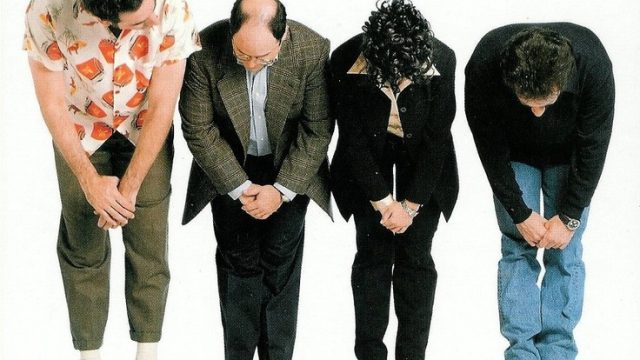Ending a drama is easy – reach the final consequence. Ending a comedy is a lot harder, and I see no intuitive way to do it. In fact, I notice that final episodes for comedies are generally either tolerated by their fanbase or deeply sentimental, like the multiple final endings to Futurama. I think there is an appeal to a sentimental ending (I like “The Devil’s Hands Are Idle Playthings” and “Meanwhile” as much as anyone), but I also believe that comedy is much harder to write than drama, and I would be more impressed by someone sticking the landing of a comedy than I am by someone saying “Wow, didn’t we love these people we spent all this time with?”
(This is why I at least admire the Seinfeld finale – they botched the execution, but there’s a genuine attempt to find the funniest ending for these characters)
There are only a few comedies I can think of that really tried to embrace having a funny ending. My favourite is 8 Bit Theater, because not only is the ending funny, it’s a kind of summary of the comic’s comedy. As you may well know, there are three main gags in 8 Bit Theater: running gags carefully scattered through the comic to come back long after you’d forgotten about them (most famously: Fighter’s attempts to get sword-chucks to work), pranks on the reader (with every ‘serious’ plot given an anticlimactic resolution), and, as a matter of course, the characters nitpicking and arguing the entire way through.
This culminates in the final boss fight, when the characters go up against the personification of Chaos. As the characters bicker about how exactly they’re gonna take down the bad guy, they turn back around to find White Mage has taken down Chaos with the help of her friends Priest, Shaman, and Healer – that is to say, four white mages, just as Black Mage was advised when he read a strategy guide back in strip seven. This is one final gag that brings together all three elements of the strip’s humour at their most extreme – the most absurd length of time between setup and payoff on a gag*, a dramatic payoff so anticlimactic that the villain isn’t even completely offscreen when it happens, and this all happening because the characters were arguing over something dumb.
*Author Brian Clevinger even remarked that it was always the plan to end that way, he just didn’t expect it to take seven years to get to the punchline.
There’s another comedy where the final joke is really the culmination of the humour, but unfortunately I haven’t seen it: Review, starring Andy Daly. Based on description from beloved Soluter Ruck Cohlchez, it sounds like that show ends with not only one last absurd expression of its antihero’s neuroses, but that you simply could not have a more absurd expression of his neuroses. There is simply nowhere to go after that final joke, not just because it’s unbelievably bleak, nor even because the protagonist is stuck in an immovable hell, but because there’s simply nothing more absurd or funny that you could do with the premise.
Now, this idea of endings is me riffing on the fact that this is my final essay here at The Solute. Next week, I’ll be fully moved over to Media Magpies – today I’m publishing an essay on Whedonesque characters – and I hope I get to see you there. Good luck with whatever you do.

